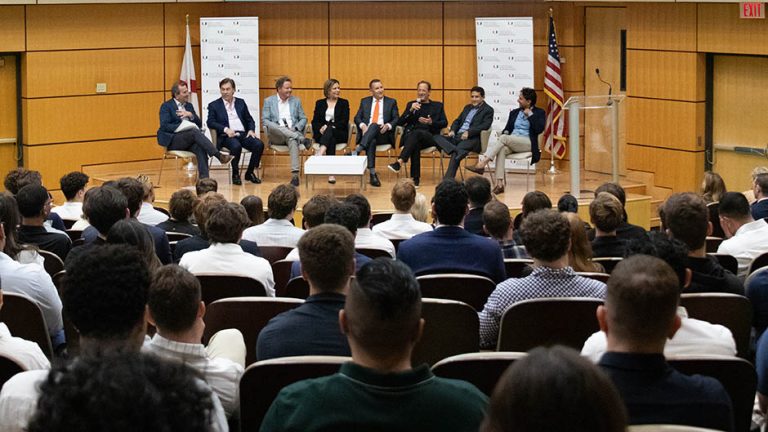Opinion leaders devote their energy and seriousness to University of Miami Patti and Allan Herbert Business School Accelerated MBA Program in Real Estate, but their busy schedules only allow them to get together a few times a year. When word spread that many students would be on campus for a real estate business roundtable, Miami Herbert students, grateful for the opportunity, came in droves to listen and learn.
This is perfectly understandable, given that the commercial real estate (CRE) luminaries on stage at Miami Herbert’s Storer Auditorium collectively controlled assets worth billions of dollars. Plus, they had all made money in Miami’s CRE market during both tough and good economic times.
“This is a very sharp, high-performing group,” observed Manny de Zarraga, executive managing director of JLL Capital Markets, BSCE ’83, MA ’83, who served as moderator. “Almost all of us are members of the University of Miami Business School. Real Estate Advisory Council. One of the best parts of our meeting is being able to discuss and agree on what we are seeing in the market.
As the roundtable discussion began, it quickly became apparent that most CRE industry leaders in Miami were not feeling the severe pandemic-related pain that their colleagues across the country were feeling. Agree with de Zarraga on this point:
- Edgardo Defortuna, MBA ’82, President, Founder and CEO, Fortune International Realty
- Tere Blanca, BBA ’81, MBA ’83, Founder, Chairman and CEO, Blanca Commercial Real Estate
- Michael Comras, BBA ’83, president and CEO of The Comras Company, a full-service real estate brokerage and investment firm
- Warren de Haan, co-founder and CEO of Acore Capital
- Neil Shah, President and CEO of Hersha Hospitality Trust
- Michael Sommers, BSF ’04, senior vice president for development and acquisition/Southeast, Grand Peaks real estate investment trust
- Malcolm Butters, BBA ’82, CEO, Butters Construction & Development
When it was Warren de Haan’s turn to speak, the Acore Capital executive momentarily looked out at an audience made up mostly of students.
“What I want you to come away with is: The rest of the country is not Miami, okay?” de Haan burst out laughing. “So spend your time reading articles like the Wall Street Journal, the New York Times, The Economist. Put down your iPhone and pay attention to what’s happening outside of Miami. Because (not doing so) will give you a false perspective of what is happening in the economy.
“In South Florida, there is an imbalance between supply and demand, meaning there is greater demand for commercial real estate than there is supply.” said de Haan. “But when it comes to the rest of the markets, we really need to focus on capital flows. I want you to think about these larger concepts. Flows of loan capital. Liquidity. The banking system.
Brickell-based Blanca Commercial Real Estate principal Tere Blanca observed that “Miami crushes it” in terms of its ability to lease office space, but quickly added that “we’re an anomaly.” We have clients who own portfolios of office buildings across the country and around the world. And certainly, the stories in these markets are very different from what we experience here.
“People want to live here, and employers track where they want to live,” said Blanca, who started her business in 2009. “So for us in power, it’s about telling the story of why you should be here and to create an environment where people want to show up to work.
Butters Construction & Development focuses on industrial real estate, primarily warehouses. CEO Malcolm Butters was all smiles as he recounted how “the industry became the darling” of Miami’s CRE segment during the pandemic, because homebound consumers made many purchases online, propelling rivers of merchandise into warehouses in the Miami area.
“We’re in the best market in the country,” Butters said. “Of all the CRE sectors here, industrial probably has the most secure future in South Florida.” He explained that industrial is the least capital-intensive CRE category because warehouse owners don’t have to spend money beautifying their properties for tenants.
Contrasting Butters’ unbridled optimism, Hersha Hospitality Trust President and CEO Neil Shah sounded a warning regarding how the pandemic has damaged the hotel holdings of his real estate investment trust based in Pennsylvania. However, he taught a key lesson to Miami Herbert students that resilience and adaptability are necessary to thrive in the CRE space.
“Miami has been one of the best lodging markets in the country, I would say for 20 years,” Shah said. “But this year, compared to last year – in luxury and lifestyle hotels – our revenue is probably down 15 percent.
“It makes things difficult, it makes things difficult,” Shah said. “And that’s what leads companies to sometimes look for a more permanent source of capital.” We created a public platform to help us access slightly more permanent capital. Thanks to the advantages of having good lenders and having good access to capital in the public markets, we have been able to weather the pandemic.
Michael Sommers revealed that his real estate investment company, Grand Peaks, has “purchased approximately 2,700 apartments in Miami over the last decade, more than anyone on Earth!” So we have a pretty good view of what’s happening in the markets from a local demand perspective.
The outlook in Miami is astonishing, with most properties here, as well as in Broward and Palm Beach counties, at 95 percent occupancy, Sommers said. Through an anecdote from another Real Estate Business Roundtable participant, Sommers also gave Miami Herbert students a lesson in dedication.
Moderator Manny de Zarraga recounted that about ten years earlier he had met a young executive who proudly mentioned that he took flights to different cities on weekends, just to look at recently acquired apartment complexes by his employers.
The name of this leader? University of Miami alumnus Michael Sommers, who at the time worked for a company called Equity Residential.

